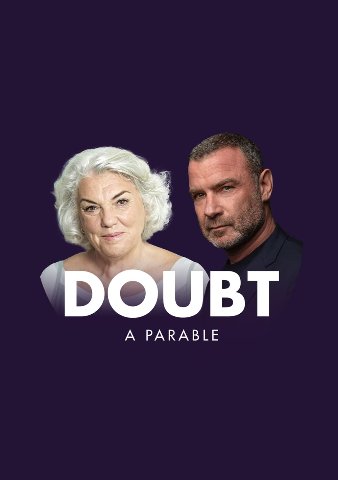Doubt a Parable
Revival on Broadway
By: Karen Isaacs - Apr 11, 2024
A key to your reaction to the fine revival of Doubt a Parable now on Broadway through the end of April, is your experience with people jumping to conclusions or letting personal feelings color their thought processes.
Though John Patrick Shanley’s play opened in 2004, he wisely set it in 1964. The Catholic church was in turmoil, but not for the priest abuse scandals that were roiling the church in 2004. The turmoil was caused by changes implemented by Pope John Paul the XXIII and Vatican Two, including the dropping of the Latin mass, proclamations on religious tolerance, and a philosophy that the church needed to be more involved with the community.
What is true? Since seeing this revival starring Amy Ryan (who replaced Tyne Daly) and Liev Schreiber, I’ve been rethinking and analyzing my reactions to this play.
I saw the original Broadway production with Cherry Jones and Brian F. O’Byrne. I’ve also seen the film (starring Meryl Streep and Philip Seymour Hoffman), and other productions. Years have passed, and events have increased our knowledge of the underlying problem of sexual abuse of boys by priests.
Shanley subtitled the play “A Parable.” Often, we pay little attention to subtitles, but “A Parable” got me examining it in relation to the plot and sent me to the dictionary. In religious terms, a parable is defined by Merriam-Webster Dictionary as “a usually short, fictitious story that illustrates a moral attitude or a religious principle.”
The play is set in a Bronx Catholic Church that has a parochial school adjacent. It opens with Father Flynn’s homily on “doubt.” His second is on intolerance, specifically gossip.
The central question is: is Father Brendan Flynn molesting an 8th-grade student at the school, the first African-American student? The principal of the school adjacent to the parish, Sister Aloysius Beauvier, is convinced he is and that it is her moral duty to get him removed. Or is it just that Sister Aloysius strongly dislikes him for his embrace of the new practices and philosophy in the church? The young teacher, Sister James, at one point, tells her, “You don’t like him.” It does seem like Sister Aloysius is looking for any detail that might prove her belief, refusing to consider plausible alternative explanations. On the other hand, has Sister Aloysius had previous experiences that have made her more aware of the possibility of abuse? You can find some implications of that Sister Aloysius firmly believes in strict discipline and fear.
The most satisfying productions of this play are those that do not stack the deck in either direction. Director Scott Ellis has done that, not letting the performers lean too much in the direction of guilt or innocence. All four cast members walk that fine line, but Amy Ryan as Sister Aloysius and Live Schriber as Father Flynn must be the most careful. Each succeeds.
Is it time, or has Ellis brought more attention to another issue: the imbalance of power in the Catholic Church between men who have authority and women who don’t? It seems a more feminist touch permeates the production. For me, at least, he has also emphasized the fact that the boy, Donald Muller, is gay. In a powerful but brief scene between Sister Aloysius and his mother (an outstanding Quincy Tyler Bernstine), the mother is open that her son is “that way,” which is why he was in danger at this previous school and why his father dislikes him.
If Shanley tilts the tables at all, it is making Sister Aloysius hard to like. You could describe her with adjectives that include cold, uncaring, hard, unyielding, and a strict disciplinarian. No wonder the students are terrified of her; she is proud of that and believes her teachers should be that way, too.
Schreiber’s Father Flynn is more likeable. With his Bronx/Irish accent, he seems able to relate to the boys at the school – playing basketball with them, pointing out that dirty fingernails will drive the girls away, and more. Yet, he includes some gestures and inflections that could cause doubt. The only real problem is the play works best when Sister Aloysius is significantly older than Father Flynn. She had been married but was widowed during WWII. Schreiber looks closee to her age, but he is so magnetic on stage that you suspend your disbelief.
The audience is, in fact, the jury, though we never know what their verdict will be. I would be very interested to see how audiences vote and if that has changed from 2004 to now.
Whatever your verdict, I am sure you will have doubts.

